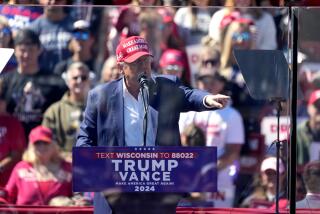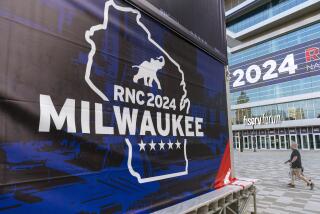Wisconsin in near-chaos over anti-union bill
Wisconsin was in political limbo, if not chaos, on Thursday as more than 20,000 protesters swarmed the state Capitol to denounce the new Republican governor’s plan to strip collective bargaining rights from most public-sector unions, and Democratic lawmakers fled the state, denying the GOP majority the quorum it needed to pass the bill.
Gov. Scott Walker’s budget repair bill has sparked days of demonstrations and is one of a number of attempts by newly elected Republicans to strike at public-sector unions, one of the pillars of the Democratic Party.
Conservative analysts have long contended that excessively powerful unions representing teachers, welfare workers and other state and local employees have boosted pay and pensions across the country, laying the groundwork for the nation’s fiscal crisis.
The biggest crowds of the week squeezed into the Capitol on Thursday, shouting down the state Senate president as he tried to start the session. Thousands more gathered outside, their cries echoing off the building’s stone walls well into Thursday night. During the day, 15 school districts in the state closed because teachers were at the protests.
Before the expected vote on Walker’s proposal, all 14 Democratic senators fled, leaving Republicans one senator short of a quorum. The Senate adjourned without debating the bill.
Demonstrators agreed that cuts were required but argued that Walker was going too far.
“This is disgusting,” said union ironworker Sean Collins of Waunakee. “Everybody in Wisconsin should be scared, because if the unions go down, everybody else’s standards will go down.”
Walker defended his proposal at a news conference in Madison, as demonstrators watching a live feed in the Capitol chanted, “Re-call Wal-ker!”
“These are bold political moves we are talking about today, but they’re modest, modest requests,” Walker said, calling for Democrats to end their “stunt” and return to work. “What we’re talking about here is ultimately about balancing our budget.”
But observers said Walker’s proposals went beyond immediate cost savings.
“What’s going on in Wisconsin is not simply an attempt to adjust the benefits or co-pays or health plans,” said Theda Skocpol, a political science professor at Harvard University. “It’s an attempt to bust the unions.”
Republicans are hoping to emulate Walker’s actions across the Rust Belt. In Ohio on Thursday, a state hearing was held on a proposed Wisconsin-style law that is backed by the state’s new governor. That drew about 1,800 protesters.
Similar measures are making their way through legislatures in Iowa and Michigan — all union strongholds, but also states where Republicans seized the governorships and both houses of each legislature in last year’s election.
In 1959, Wisconsin was the first state in the nation to give all public-sector workers collective bargaining rights. Many states soon followed, and public-sector union membership swelled even as the labor movement began to lose workers in the private sector. Currently, only 12 states deny public workers the right to collective bargaining, and more workers are unionized in government than in the private sector.
“If we live in a dynamic global economy where unions have gone the way of the dinosaur in the private sector, why should we still have unions in the public sector?” asked Chris Edwards, an economist at the Cato Institute in Washington. “The issue has been under the radar for some time and these problems have built up over the years.”
To labor groups, the assault is purely political.
“All across the country, Republican governors and legislators have almost immediately moved to strip working families of their rights and eliminate their unions as political payback to their Wall Street and corporate CEO donors,” said Eddie Vale, a spokesman for the AFL-CIO.
In most states, including California, state legislation is what permits government workers to bargain collectively for pay raises. It takes a simple change in the law to remove much of labor unions’ clout. (Private-sector workers and federal employees are governed by federal law, and states cannot deny them the right to collective bargaining.)
Steve Smith, a spokesman for the California Labor Federation, noted that it was unlikely that similar steps would be taken in California, which is controlled by Democrats. But, he noted, Republican gubernatorial candidate Meg Whitman blamed much of the state’s fiscal mess on unions.
“Had she won,” Smith said, “we might be looking at a situation like we have in Wisconsin.”
Walker’s proposal would not apply to police, firefighters or state troopers. It would require all other state workers to pay half their pension costs and 12.6% of their healthcare coverage, shaving an estimated $330 million off a $3.6-billion deficit. It would also prevent public workers from receiving raises above the inflation rate unless the increases were put to a vote. Walker promises no layoffs of public workers should the measure pass.
He said his office had received 8,000 e-mails, most urging him to stick to his guns. “The protesters have every right to be heard,” Walker said. “But I’m going to make sure the taxpayers are also heard.”
Teachers were heavily represented in the Capitol demonstration, but their ranks were swollen by solidarity-minded union workers from the private sector, some in hardhats. In a distinctively Wisconsin touch, a union electrician passed out bratwurst.
Protesters carried signs, including one with the slogan “Impeach Scott Mubarak,” an allusion to Egypt’s recently unseated leader, Hosni Mubarak.
Walker’s plan is expected to easily pass the state Assembly, which Republicans control by a wide margin. Their margin in the Senate is narrower, and a few GOP senators have expressed reservations about the plan. But everything was turned upside down midday Thursday when the chamber’s Democrats vanished. The Senate’s leading Republican asked Capitol police to track down the lawmakers, but they had already cleared out.
“Senate Democrats took action today to allow time for the involved parties to work together to balance the budget,” Senate Minority Leader Mark Miller said in a statement. “We believe, out of respect for our public institutions, the people of Wisconsin and our long tradition of working together, our fiscal challenges can be met without taking away workers’ rights.”
The caucus headed to the Clock Tower Resort, a hotel and water park just across the state line in Rockford, Ill., but they scattered from there. Hotel management said the senators left before their presence would conflict with a scheduled Chocoholic Frolic.
In an interview with a Wisconsin television station, President Obama raised concerns about the proposal.
“Some of what I’ve heard coming out of Wisconsin, where you’re just making it harder for public employees to collectively bargain, generally seems like more of an assault on unions,” Obama said. “And I think it’s very important for us to understand that public employees, they’re our neighbors, they’re our friends.”
It was unclear whether anything would change Friday, with Democrats still in hiding, protesters saying they would stay the night at the Capitol and Republicans vowing to try again to get the measure through.
Hinkel reported from Madison, Wis., and Riccardi reported from Denver.
Chicago Tribune reporter Rex W. Huppke in Rockford, Ill., contributed to this report.
More to Read
Sign up for Essential California
The most important California stories and recommendations in your inbox every morning.
You may occasionally receive promotional content from the Los Angeles Times.










